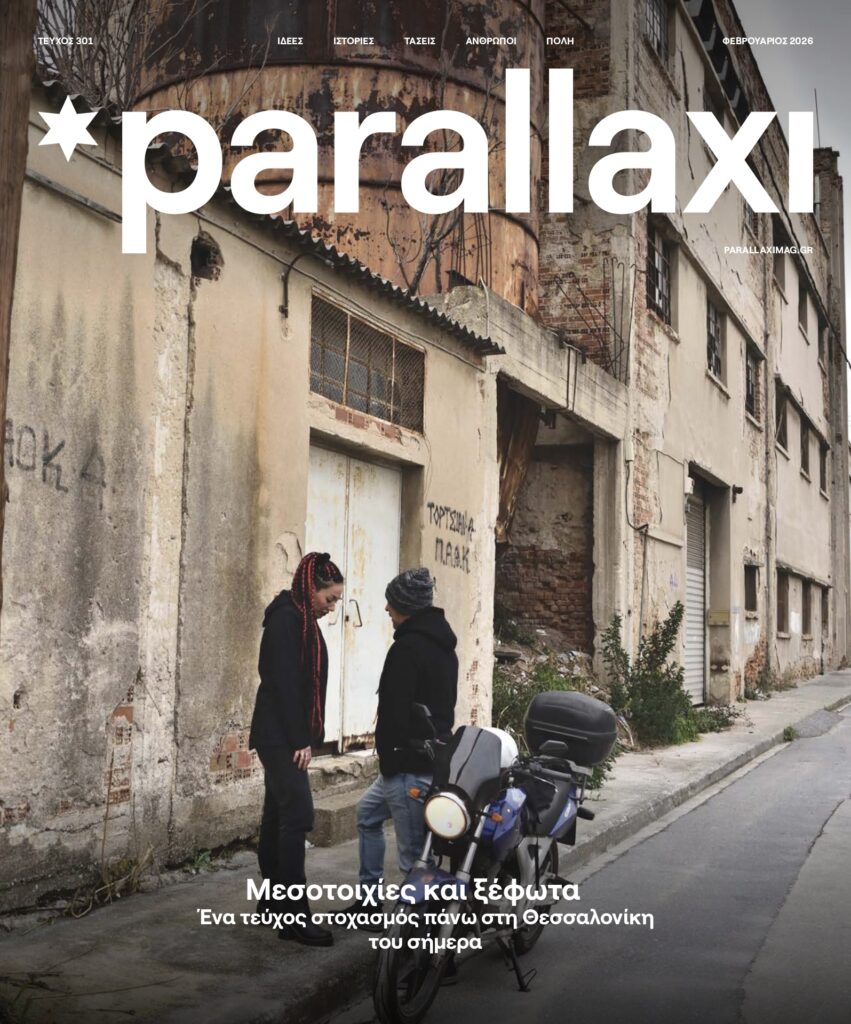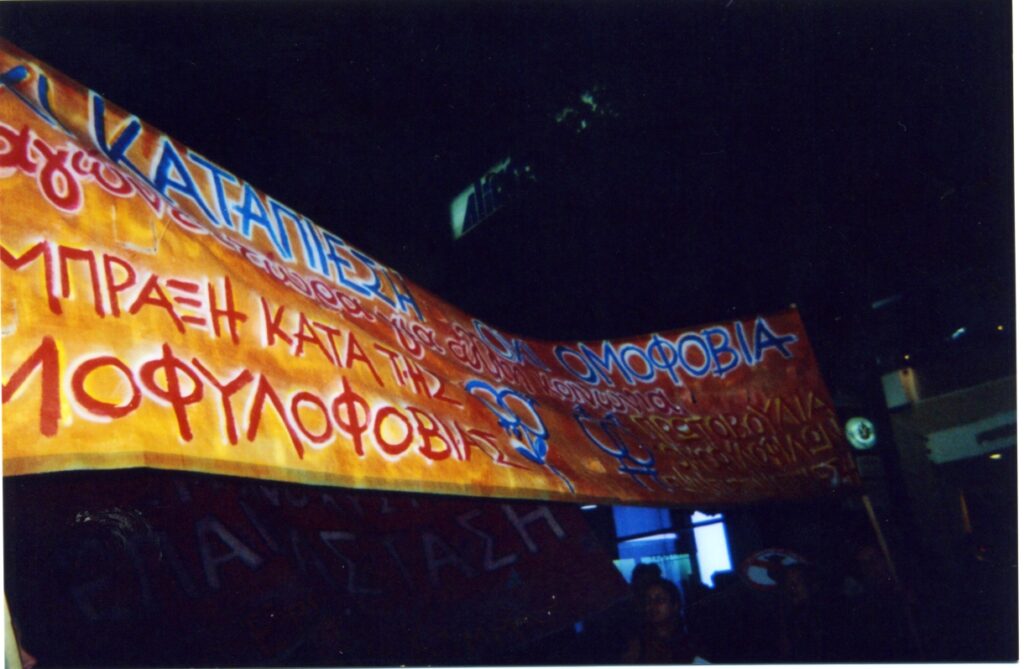The history of the LGBTQ+ movement of Thessaloniki
Everything you need to know about the LGBTQ+ community in Thessaloniki
Words: Giorgos Tsitiridis
Translation: Theodora Tsali
In the 1980s it would seem like a joke, in the 1990s a lie and in 2000 a very distant dream. However, today it has become reality. This summer, Thessaloniki hosts EuroPride! Various associations, unions, conferences, magazines, movie festivals, theater performances and art exhibitions are some of the factors that prepared and built the ground for this big event.
What initiated everything was when a group of intellectuals that returned to Greece from abroad, united with their friends and in 1976 created the A.K.O.E (in Greek) – Homosexuals’ Liberation Movement of Greece. The reason behind that was the new bill N1193/1981 “Regarding Sexually Transmitted Diseases and other relevant issues”, which was submitted for parliamentary poll and legalized the prosecutions against the prostitutes, the homosexuals and the trans people. Its consequence was the first open event, the publication of AMFI magazine with its aim the gay people’s liberation, various demonstrations, events, festivals and conferences. That was the birth of the LGBTQ+ movement in Greece. In 1988, Vaggelis Giannelos establishes EOK – the homosexual community of Greece. Many other associations were formed after it, some of which still exist today– OLKE, Colour Youth, Colorful School, Rainbow’s Families, Proud Parents, Proud Seniors, Transsexual Support Association, Athens’s Pride- Athens’s Pride Festival.
Influenced by the developments in Athens as well as the intense action of the feminists against sexism and repression and of AUTH’s students, people of Thessaloniki took the first steps for a movement which in many cases was proven pioneering and determined what came next. Unfortunately, its story remains unknown as in the feature stories in the newspapers and magazines, such as in historic accounts, what is mainly being presented are the actions that occurred within the capital of Greece.
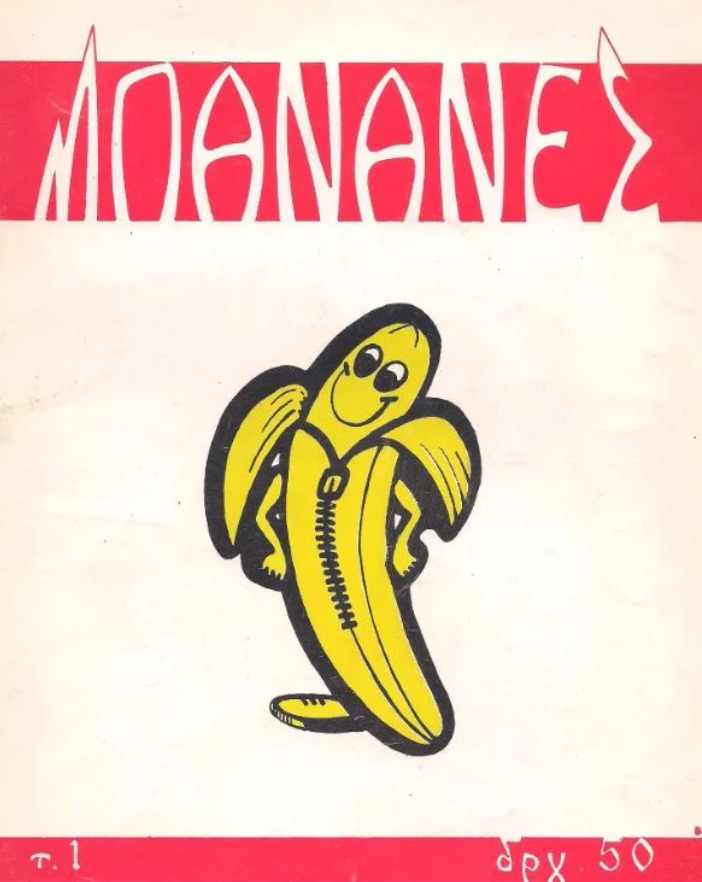
In an interview with Parallaxi, Katerina Giannouli comments:
I feel extremely lucky that I had the chance to experience Thessaloniki’s ‘golden age’ which later was ruined by the drugs that were considered an exceptional fashion, the police problems and the AIDS appearance in 1985-1986. But most importantly Kouvela’s destructive rhetoric. Thessaloniki was an exceptionally erotic city, full of life. There was an unbelievable flourish in all of its aspects. Roula Pateraki, makes her appearance in the theater domain, establishing a (). Manolis Rasoulis writes the ‘Revenge of the Romas’ which is () by the singer Nikos Papazoglou making its debut at the small amphitheater at the Law school, while pioneering spots are making their appearance while Heracles Duka’s Banal are taking place. Thessaloniki was a city which had the ability to teach you things, that lived intensively, loved the ‘nights’ and in general was in a creative fever. Various feminist, homosexual, ecological movements took place in Thessaloniki. With the help of various women college organizations, the first house exclusively for women was formed in Theagenous-Charisi Avenue. There, many issues were discussed and parties were only organized for women; men were not allowed. I got in contact with the Homosexuals’ Liberation Movement of Greece and Louka Theodorakopoulo. The first meeting occurs in the medical college’s amphitheater with its primary topic being homosexuality, manages to gather surprisingly many people, mostly Rigades, a pioneering and open association in such matters, compared to the leftist organizations who were opposing homosexuality. Their slogan was “Homosexual men and woman, think what the party you are voting for is able to do for you” was circulated on pink stickers. There, we could learn about the Amphi magazine and how A.K.O.E was formed and through that the foundation for a similar organization are built in Thessaloniki”.
In that way, AΜΟΘ (in Greek), the Liberation’s Front for Homosexuals of Thessaloniki, as well as ΚΣΑ (in Greek), Sexual Liberation Movement, which in Spring of 1980 publishes the “Bananas” Magazine with the pioneering and memorable director Achilles Psaltopoulos, in which many people, using nicknames, were involved while many of them are famous writers and artists nowadays. Unfortunately, when it became popular, it wasn’t published again as with an executive order, claiming that it was raunchy, ended up being confiscated and its publisher was taken to the court. When the publications stopped, the two organizations mentioned above kept existing within the university, organizing events against the stereotypes, prejudices and homophobia.
The infamous bill of “Regarding Sexually Transmitted Diseases and other relevant issues” was abolished. However, another nightmare reached Thessaloniki: AIDS. At that period of time, Greeks were not aware what being infected with AIDS meant. What they knew was that there is a new disease from which gay people die, thought of it as ‘gay cancer’. People were not really worried until the first Greeks and non-Greeks famous people became victims. The sudden death of fashion designer Sero Abrahamian was the first huge shock for the city of Thessaloniki. Gay men and trans women were the ones who ‘paid the heavy price’ of the AIDS stigma, with people considering them ill sinners. Conservatives, grabbing the chance, led Greece to a period of conservatism and backlash, from which it never recovered.
At the end of the decade and at the beginnings of the 1990s, Nikos Chatzitrifon, the father of the city’s movements, began his activism. Influenced by his studies abroad, Nick, while working as political engineer, was determined to fight for human rights, the visibility as well as the promotion of issues concerning the LGBTQ+ community in Thessaloniki. What made him special was his choice of involving college professors, authors, politicians, intellectuals in an effort to provide visibility and prestige to the movement and his demands.
In fact, by any chance given, he was using their statements to distinguish the opponents with the supporters and he was credited for that. The start happened with the ΟΠΟΘ, Initiative Team of Homosexuals of Thessaloniki, which published the magazine “The Desire”, 9 volumes at its first term (July 1990-Summer 1995) and following 23 monthly volumes at its second term (April 1996-Summer 1999). ΟΠΟΘ’s actions became known to the city at a quick pace. Movie screenings, talks, broadcasts at Kivoto Radio, Pride Parties at Ahududu… ‘The Desire’ did not take very long to become ‘talk of the town’. It was loved by students, intellectuals, artists for its texts as well as for the diligence, illustration and the graphical design of Ari Batsioula who for the following years would be in charge of the diligence for the next two volumes in Thessaloniki. Now, ‘The Desire’ is considered a classic and its authentic volumes have collectible value. Besides, it was the first time that Athens turned its interest to Thessaloniki’s LGBTQ+ movement.
Tsarlatann.blogspot.com remembers:
At the time period that we met, we held our meetings in Kivotos Radio and later at the school of biology spot. Many years have passed since I last held ‘The Desire’. I might still have some of the volumes packed if they haven’t been rotted by humidity. These and the ‘Kraximo’. Those days were different. Then we used to be called faggots. Neither gay, nor the idea of Civil Wedding. Our right to be faggots was supported and defended by that team. The ‘Queer’ ideology as I understood later. I experienced the effort of a human being to set up (from a point and then) a volume, all by himself, his lone ideology and at the end, his disappointment which meant the end of ‘The Desire’. I couldn’t understand many of the articles. I was also not sure if jerking off over an activist fan magazine (something I remember doing), something purposeful. For what I’m sure though is that I’m glad that within my ignorance I managed to get to know people who, in difficult times, had the balls to say that they liked to lick balls.”
The break-up of ‘ΟΠΟΘ’ in 1995 gave birth to the union “Partnership Against Homophobia” with the president Niko Chatzitrifona that starting the publication of the newspaper ‘Vitamine O’.
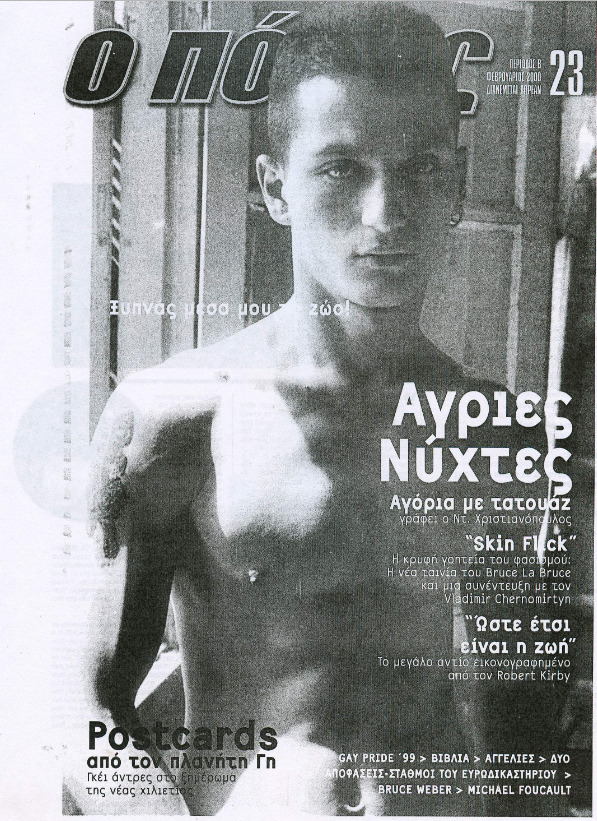
It is the same year that I moved to Thessaloniki. Having complete ignorance, I found myself within the whirlpool of that dissolution, with both of the groups giving me a bad impression. Frustration, skepticism, different opinions and ideologies. Viewing things now, after so many years that have past, I believe that the dissolutions are benefiting when they give a chance for the pluralism of opinions and choices within the borders of collaboration. Besides, every time when a group is formed, it is natural to give birth to other sub teams and this is not only a LGBTQ+ phenomenon, which seemed to peacefully collaborate throughout the passage of the years.
Kivotos Radio as well as ΟΠΟΘ shut down and ‘The Desire’ gradually stops its activities and at the beginning of the 1990s only the Partnership Against Homophobia remains active. At that period of time we create, with the collaboration of Niko Chatzitrifona and the members of the Partnership, the first and the most long-lasting LGBTQI film festival in Greece which hosted for the first time Giannari, Koutra and Dima’s movies.
It is essential to mention that it was that festival, which was called ‘Panorama of homosexual movies’, that played an integral role for the establishment in the ‘Thessaloniki International Film Festival’ and in ‘Thessaloniki international documentary festival’ the Mermaid award which is given to the best LGBTQ+ movie of the festival as it happens in all such festivals around the world. For the first time, conferences are being held with the topics discussed being marriage, families of homosexual couples and the stance of the reporters and politicians towards such issues.
The main topics of those conferences were the ways in which the movements came about politically at the first years of the 2000s and that material contributed to the publication of the two books “Families of Homosexual Couples” and “Homosexuality on the Screen”, which come out in bookshops. The “Vitamin O” stopped circulating in 2006. It is astonishing the fact that from 1996 till 2000, one could find two volumes with LGBTQ+ content at the center of Thessaloniki in the cinemas, cafes, bars video clubs.
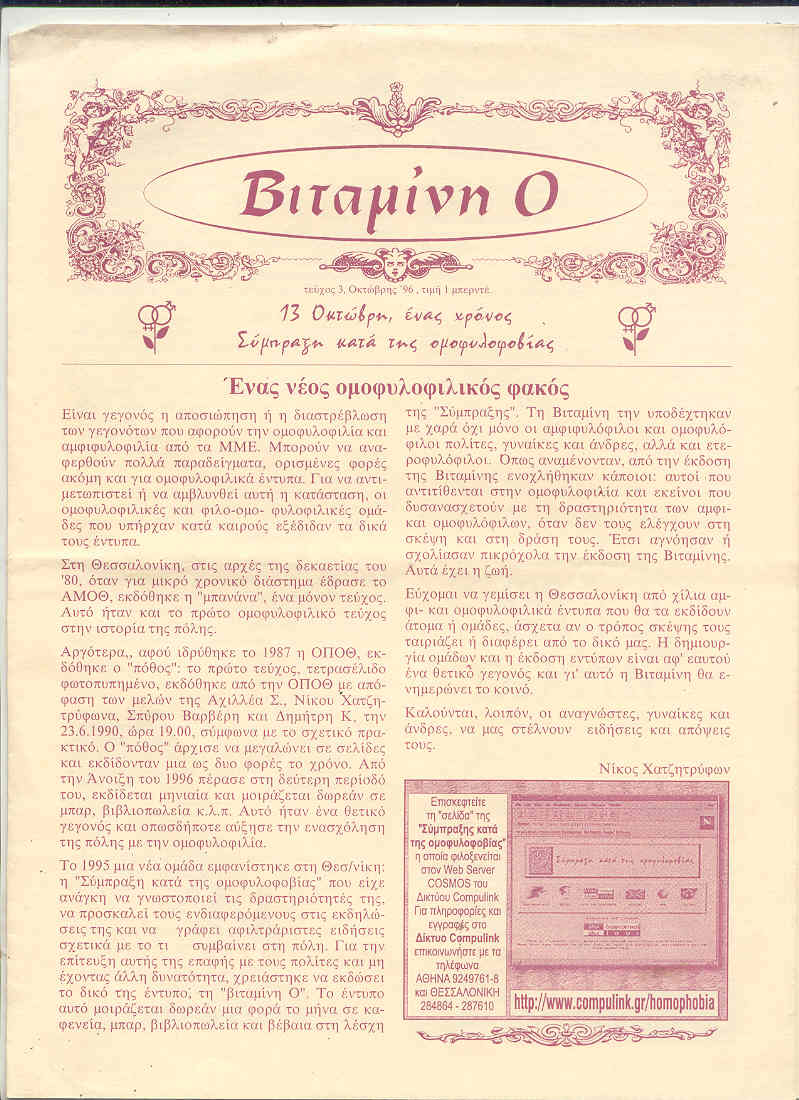
It is worth mentioning that the pamphlet and the program provided in 2nd Festival of Homosexual Movies that took place in Olympion, with the collaboration of the Film Festival in April 2000, depicted a drawing of two men kissing. The public prosecution of Thessaloniki ordered an emergency preliminary examination with the excuse of a short note that some people testified to the judicial authorities in order to find out if through the screening of those movies, chargeable offenses that concerned the legislation regarding explicit content occurred. It has to be mentioned that the movies which were investigated were already nominated in international festivals. Threats from religious and other organizations, abusive speeches coming from Panagiotis Psomiadis and from Kyriakos Vellopoulos. Nevertheless, the race had begun. This year’s incidents in the documentary’s festival, 24 years later, show that we have a long way to go.
The Enterprise of Homosexuals Against Repression (ΠΟΕΚ in Greek), which was created by lesbians and homosexuals of ΣΕΚ, as well as the wider leftist space, made its appearance in 2004 and published its own magazine until 2007 having already circulated six volumes. Its presence enhanced the openness of the movement in a wider leftist spectrum, to the universities as well as the made its first presence in demonstrations and marches with LGBTQ+ banners and slogans. I still remember with emotion the collaboration of the Partnership against homophobia and ΠΟΕΚ with its antiwar marches and strikes lifted baners for the LGBTQ+ community and circulated pamphlets.
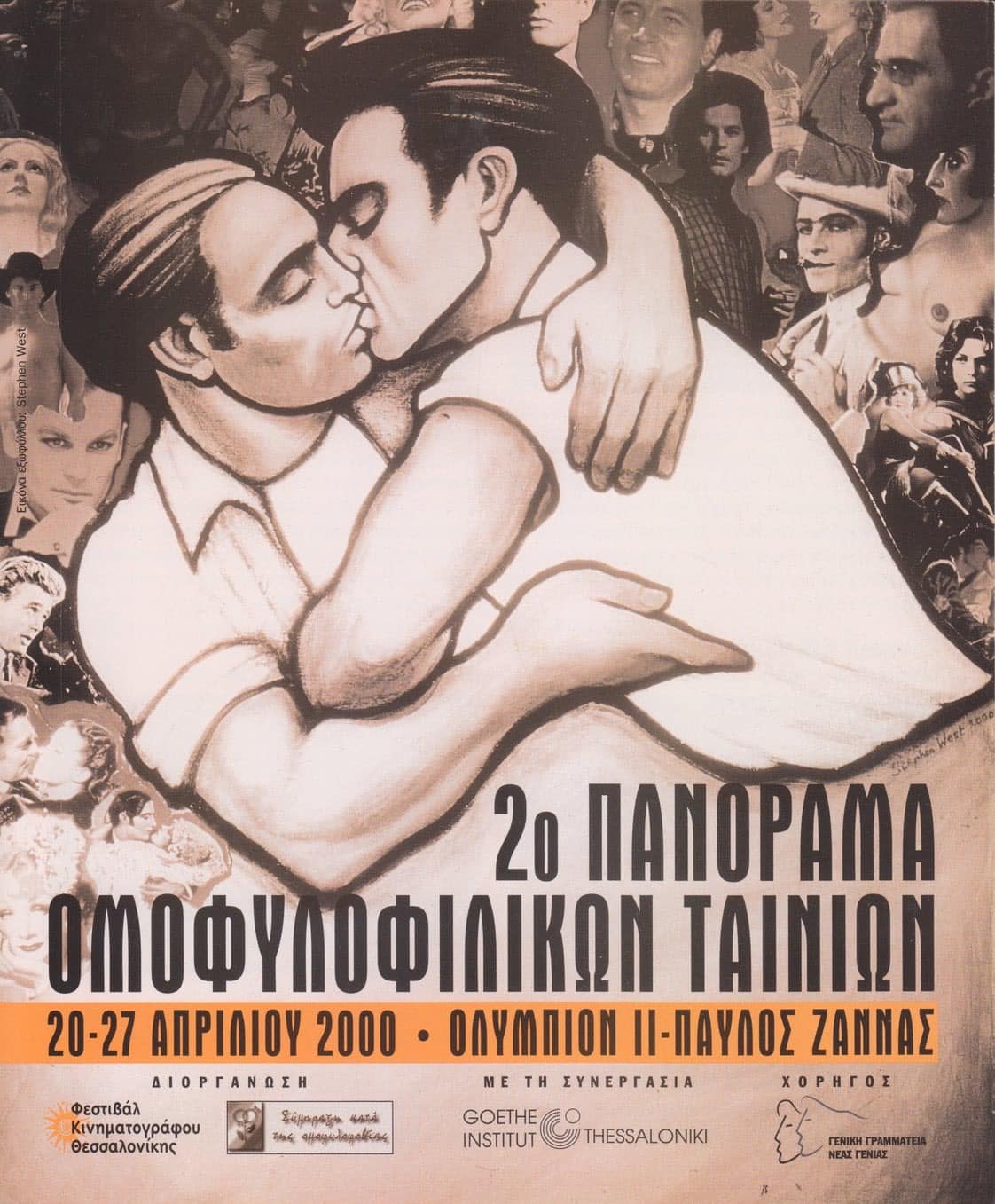
In the summer of 2008, Aris Batsioulas asks to meet me. There is an idea of a magazine that he called Screw. Andreas Ioannidis, George Striftaris and others were added in the team. The first volume circulates in October of 2008 only in Thessaloniki. The close circle of gay bars and of porn stores start to talk about it, without having noted any particular success. The second year was when it flourished. Ideological targets were set as well as a plan for its sustainability. For the Screw team, there were no forbidden issues or taboos. There were no words which should not be mentioned or provocative photos. It was distinguished for its aesthetic, which is given for once more to Ari Batsioula, for the interviews, the articles and its interaction with the audience. The magazine starts circulating in Athens and for the first time, a magazine of the second largest city of Greece is the only LGBTQ+ volume of the country after the short pause of the Athenian magazine Antivirus that today circulates one year after the big success that goes on until today. The most important contribution of Screw was the birth of Thessaloniki Pride that starts from the interview with the former Mayor of Thessaloniki, Giannis Boutaris and which occupied the Media. The Mayor expressed his intention to help to the creation of the first Thessaloniki Pride, if he was asked. More specifically he answered:
Would you support a parade in the city? A celebration of pride?
If such as parade occurs in New York, Berlin, Paris, London, in all the cities that our fellow citizens want to visit for their liveliness, their dynamism, their open spirit, why wouldn’t they take place in Thessaloniki too?
Screw made the first call for the 1st Thessaloniki Pride Festival. The rest belong to the history of Thessaloniki Pride, which was established and became an institution in a city with many difficulties, especially at the beginning, through the reactions of the city’s Bishop, Anthimos, which at the end of the day, worked as an advantage as all the progressive community, who had done that first festival at the pedestrian area of Hagia Sophia, a memorable day for human rights and the city, got together. The Screw team would stay active for one more year with the Fagazine, but later, due to the economic crisis it will stop.
Pride in Thessaloniki was claimed from more than one team that ideologically and politically differed in many issues. However, the first years the groups managed to collaborate. The first Thessaloniki Pride that has since been organizing the parade every year, collaborated with Homofonia which broke up two years later.
Soon though, different organizations came up for the accomplishment of their own Pride every May and as a result, Thessaloniki hosts two different Pride every year. First, the REclaim Pride, is the continuation of “open initiative for a self-organized Thessaloniki Pride”, which was introduced in November 2015 with the initiative of Sylvia Rivera Team. After that, the RADical Pride, which was organized by the 1st and 2nd self-organized Thessaloniki Pride, while its replacement from REclaim PRIDE occured some years later by the teams Sylvia Rivera, Kiouri@ and the youth Communist Liberation. Today, we have reached the 7th year of this self-organized Pride and the requests and organization of EuroPride from Thessaloniki Pride. For the first time, this European institution comes in Greece and will make Thessaloniki a magnet for thousands of visitors.
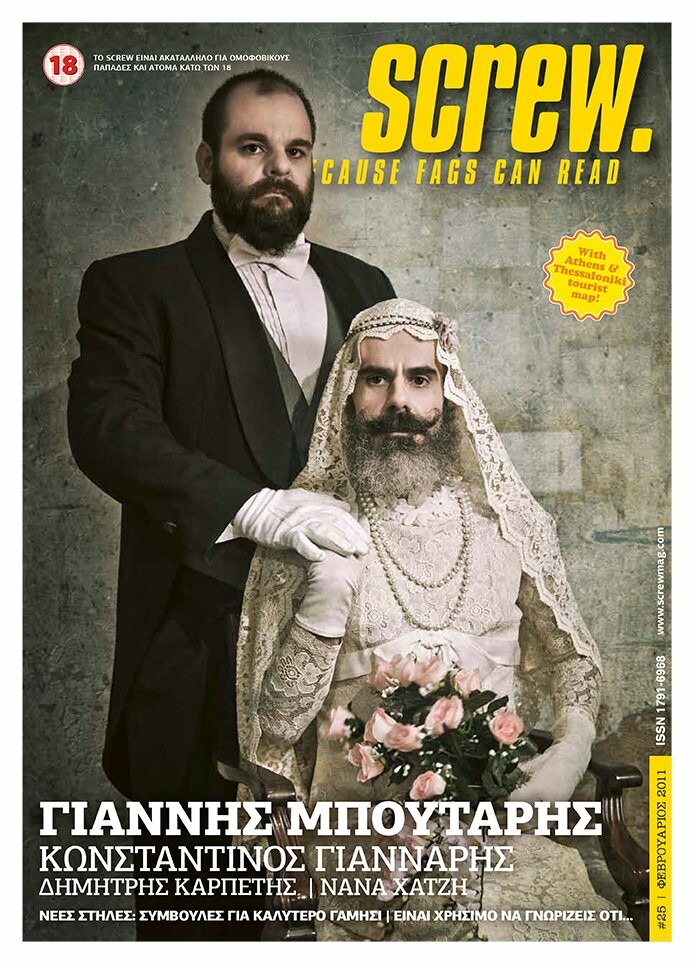
Other than parade happening every year, the “Partnership against Homophobia”, which was later named “Partnership for the social sex” and ending up called “Partnership for the sex” is the only team left active with several seminars, movie screenings and conferences talks. LGBTQ+ interests have concentrated on legal assets with the collaboration with local and state sectors, something prohibited two decades ago. Greece, compared to other countries, the past few years has taken important steps in regards to equality of human and LGBTQ+ rights. The cohabitation agreement, the bill on the gender identification, the abolishment of the exclusion of LGBTQ+ people from blood donations, the new anti-racist bill, the voting for civil wedding is only the beginning. Then, followed the #me too movement which gave courage to many people to talk about domestic violence, bullying, rapes and abuse. Today, LGBTQ+ people are accepted by their families, the school and broader family environment and have many supporters on their side. Politicians and reporters are brave enough to talk about relevant issues. This however, is not a call for rest. We should not forget Zach and Anna’s the Cuban trans immigrant assassination, the lynching of the Queer young people in Aristotelous square, the attack on the Mayer Gianni Boutari, the burning of rainbow flags at Prides, the fascists attacks and await to see how one, large celebration like EuroPride will have negative reactions. Even if its accomplishment looks like a utopia the fight for equality and egalitarianism doesn’t end here.
